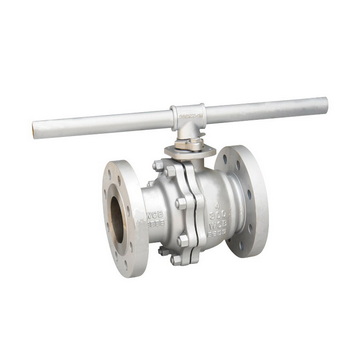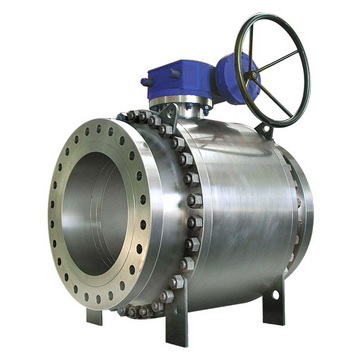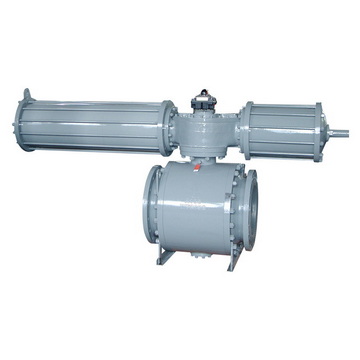Best Flanged Ball Valves for High-Pressure Industrial Systems
Content Menu
● What is a Flanged Ball Valve?
● Advantages of Flanged Ball Valves in High-Pressure Applications
● Types of Flanged Ball Valves
>> Trunnion (Ear-Axis) Ball Valves
● Material Considerations for High-Pressure Flanged Ball Valves
● Common Industrial Applications of Flanged Ball Valves
● OEM Services for Flanged Ball Valves
● Installation and Maintenance Best Practices
● FAQs About Flanged Ball Valves
>> 1. What is the primary advantage of using flanged ball valves in industrial settings?
>> 2. How does a floating ball valve differ from a trunnion ball valve?
>> 3. Can flanged ball valves be used for corrosive fluids?
>> 4. How often should flanged ball valves be inspected or maintained?
>> 5. What OEM customization options are available for flanged ball valves?
In the ever-demanding industrial sector, the need for highly reliable and durable valves has never been greater. Among these, flanged ball valves stand out as a pivotal component for controlling flow in high-pressure systems. This article explores the design, benefits, and applications of the best flanged ball valves available today, focusing on their use in critical sectors such as oil and gas, seawater desalination, and offshore drilling platforms.

What is a Flanged Ball Valve?
A flanged ball valve is a type of valve featuring a spherical disc (the "ball") that rotates within a valve body to open or close flow. The key difference lies in its flanged ends, which connect directly to pipe flanges using bolts, providing a secure, leak-free seal ideal for high-pressure systems.
Flanged ball valves combine the ball valve's excellent flow control capabilities with the robust flange connection, making them highly suitable for demanding pipeline installations. The flanged connection allows easy installation, enabling valves to be bolted between flanged pipe ends, enhancing mechanical strength and simplifying maintenance or replacement.
Advantages of Flanged Ball Valves in High-Pressure Applications
Flanged ball valves offer several benefits that make them the preferred choice for high-pressure industrial systems:
- Strong Sealing Capacity: The flange end connections provide a leak-tight seal, crucial for preventing fluid loss and ensuring safety under high pressure.
- Ease of Installation and Maintenance: Flanged valves can be quickly bolted or unbolted from pipelines, making maintenance faster and less costly compared to other connection types such as welded or threaded joints.
- High Durability: Constructed from materials like stainless steel and carbon steel, flanged ball valves offer excellent resistance to corrosion, abrasion, and high temperatures, thereby enhancing lifespan in harsh environments.
- Versatility: They handle a wide range of media including liquids, gases, and slurries, making them versatile for applications across oil and gas, petrochemical, power generation, and water treatment sectors.
- Precise Flow Control: Ball valves provide quick quarter-turn operation, allowing precise start, stop, or throttling of flow.
These advantages translate into operational safety, efficiency, and cost savings for industries relying on high-pressure piping systems.
Types of Flanged Ball Valves
Our factory specializes in designing and manufacturing three main types of flanged ball valves, each optimized for different industrial needs:
Floating Ball Valves
In floating ball valves, the ball is held between two seats but is free to move slightly downstream under pressure. This movement presses the ball against the downstream seat, creating a tight seal. Floating ball valves are generally preferred for smaller diameters and moderate pressure applications due to their simplicity and cost-effectiveness. They are highly reliable for preventing leakage and accommodate pressure fluctuations well.
Trunnion (Ear-Axis) Ball Valves
Trunnion ball valves feature a mechanically anchored ball supported by trunnions at the top and bottom. This fixed position means the ball does not move under pressure, significantly reducing torque required to operate the valve. These valves are especially suitable for larger-diameter pipelines and high-pressure applications because they can handle higher forces with greater stability. Their design minimizes wear on the valve seats and stem, making them ideal for critical heavy-duty operations.
Top-Entry Ball Valves
Top-entry ball valves allow access to internal components by removing the top cover of the valve body. This design enables maintenance, inspection, or repair without removing the valve from the pipeline, which saves time and reduces downtime. Top-entry valves are preferred in highly sensitive or hazardous fluid systems where minimizing system interruption is essential.
Material Considerations for High-Pressure Flanged Ball Valves
Material selection plays a crucial role in ensuring the performance and longevity of flanged ball valves in demanding industrial environments.
- Stainless Steel: This material provides exceptional corrosion resistance, making valves suitable for seawater desalination systems and chemical processing where aggressive fluids are common.
- Carbon Steel: Widely used in oil and gas sectors, carbon steel offers high strength and toughness. Though less corrosion-resistant than stainless steel, carbon steel valves can be coated or lined for enhanced protection.
- Special Alloys and Exotic Materials: For environments exposed to extreme temperatures or corrosive chemicals—such as offshore drilling platforms—valves can be manufactured using alloy 20, monel, inconel, or hastelloy. These materials provide enhanced performance in severe conditions.
Proper material matching with application conditions helps prevent premature valve failure and improves overall system reliability.
Common Industrial Applications of Flanged Ball Valves
The versatility of flanged ball valves makes them indispensable across multiple high-pressure industries:
- Oil & Gas Industry: In upstream, midstream, and downstream operations, flanged ball valves regulate and isolate crude oil, natural gas, and refined products. Their ability to endure high pressure and aggressive fluids ensures pipeline safety and operational continuity.
- Seawater Desalination Plants: Seawater's corrosive nature demands valves made with corrosion-resistant materials like stainless steel. Flanged ball valves maintain tight seals and smooth operation throughout the plant's filtration and pumping processes.
- Offshore Drilling Platforms: Valves used on platforms must withstand harsh offshore environments, including saltwater spray, high pressures, and temperature variations. Trunnion and top-entry flanged ball valves provide reliable isolation and flow control critical for safe drilling operations.
- Chemical Processing: Valves designed with special alloys can handle corrosive and toxic chemicals safely, ensuring precise flow control within processing units.
- Power Generation: High-pressure steam and water pipelines in power plants utilize flanged ball valves due to their durability and effective sealing capabilities.

OEM Services for Flanged Ball Valves
Our factory provides comprehensive OEM services for high-quality flanged ball valves tailored to a wide range of client requirements including international brands, wholesalers, and manufacturers. Our value proposition includes:
- Custom Design & Engineering: We work closely with clients to design valves that meet specific pressure ratings, sizes, flange standards (ANSI, DIN, JIS), and material preferences.
- Advanced Manufacturing Processes: Utilizing modern CNC machining, forging, welding, and testing equipment, we ensure precision and conformity to international quality standards such as API, ISO, and CE.
- Flexible Volume Production: Capable of handling both small batch orders and large-scale production runs with competitive lead times.
- Quality Assurance: Each valve undergoes rigorous pressure testing, leak assessment, and inspection to guarantee performance and durability.
- Packaging & Delivery: Tailored packaging solutions ensure product safety during transportation globally.
Choosing an OEM partner with extensive experience in flanged ball valve manufacturing can dramatically improve project outcomes and operational efficiency.
Installation and Maintenance Best Practices
For optimal performance of flanged ball valves in high-pressure systems, proper installation and regular maintenance are essential.
- Ensure flange faces are clean, flat, and aligned before bolting the valve in place to avoid leaks and mechanical stress.
- Use the correct gasket materials compatible with the process fluid and operating temperature.
- Apply appropriate bolt torque in a sequential crisscross pattern to achieve even flange compression.
- Regularly inspect valve operation, focusing on stem seals, ball rotation smoothness, and seat condition.
- Lubricate stem and seat components periodically according to manufacturer recommendations to prevent wear.
- For critical applications, schedule routine preventive maintenance checks every 6 to 12 months.
Correct care extends valve life, reduces downtime, and prevents costly failures.
Conclusion
Flanged ball valves are indispensable components in high-pressure industrial systems, offering unmatched reliability, durability, and ease of maintenance. Their robust flange connections ensure leak-free performance even under extreme pressure and challenging fluid conditions. Our factory delivers premium-quality floating, trunnion, and top-entry flanged ball valves expertly engineered for critical sectors like oil & gas, seawater desalination, and offshore drilling. With full OEM capabilities, we provide custom solutions that meet global standards and client specifications. Contact us today to discuss your project requirements and discover how our high-performance flanged ball valves can optimize your operations.

FAQs About Flanged Ball Valves
1. What is the primary advantage of using flanged ball valves in industrial settings?
Flanged ball valves provide a strong, leak-free connection suited for high-pressure applications, simplifying installation and maintenance, and ensuring operational safety.
2. How does a floating ball valve differ from a trunnion ball valve?
A floating ball valve's ball is free to move slightly to maintain seal tightness under pressure, typically for smaller sizes, whereas a trunnion ball valve's ball is fixed via top and bottom supports making it suitable for large, high-pressure pipelines with reduced operating torque.
3. Can flanged ball valves be used for corrosive fluids?
Yes, when manufactured with corrosion-resistant materials like stainless steel or special alloys, flanged ball valves can effectively handle corrosive fluids such as seawater and aggressive chemicals.
4. How often should flanged ball valves be inspected or maintained?
Routine inspections every 6 to 12 months are recommended, focusing on flange connections, seat and stem condition, and lubrication status to maintain valve reliability in high-pressure systems.
5. What OEM customization options are available for flanged ball valves?
Customization may include valve sizing, material selection, flange dimension standards, internal trim options, pressure ratings, and special coatings or treatments tailored to specific client needs.
Hot tags: Best Flanged Ball Valves for High-Pressure Systems, High-Pressure Flanged Ball Valve Manufacturers, Industrial Flanged Ball Valves for High Pressure, Heavy Duty Flanged Ball Valves, High-Pressure Flanged Ball Valve Suppliers, Flanged Ball Valves for Industrial Applications, Durable High-Pressure Flanged Ball Valves, Top Flanged Ball Valves for High-Pressure Systems, High-Pressure Flanged Ball Valve Solutions, Reliable Flanged Ball Valves for Industry